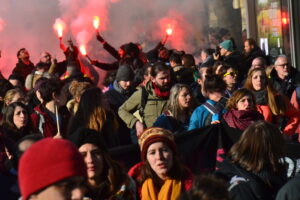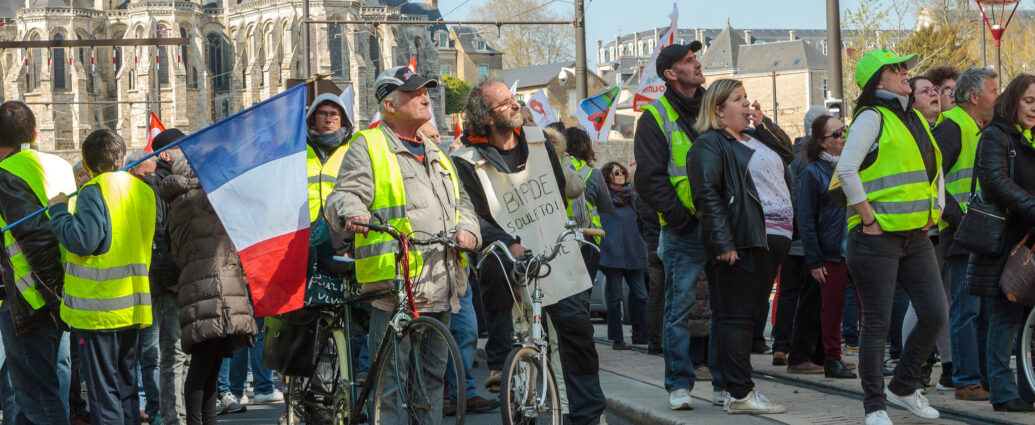Nellie Monneret
Protests are a common occurrence in France, with some political uprisings having inspired other nations throughout history. However, recent governments have attempted to reduce their pace.
It is no secret that French citizens resort to demonstrating against any law or reform that threatens the social rights and freedoms their ancestors have fought for.
But, in an ever-changing capitalist world, any sense of protectionism towards social privileges is constantly challenged, and the trade unions and French citizens who took part in protests to protect the social state in recent years have observed this change.
According to French law, each protest must be declared to authorities a minimum of three days before it’s due to take place. Authorities have the right to ban a protest or prevent action by some participants if they see a significant threat to public order. However, this is very rare, with organisers able to appeal the decision to the judiciary. According to French law, undeclared protests are not illegal unless organisers have purposefully ignored a ban.
PRO PALESTINIAN PROTESTS IN FRANCE
Despite the French ban
The people are with Palestine pic.twitter.com/W8P78myZKN
— Sulaiman Ahmed (@ShaykhSulaiman) November 20, 2023
Violent Clashes With Protestors
In late 2018 and through 2019, many regions in France were shaken by the “gilets jaunes” (Yellow Vests) movement. This movement was established by grassroots citizens who initially protested against a planned petrol and diesel tax rise to enforce the country’s transition to green energy.
For weeks, hundreds of thousands of protesters staged roadblocks, barricaded roundabouts and blocked fuel depots. But the movement quickly spread, and other social and economic causes were added to the Yellow Vests’ agenda until it became an anti-government movement.
“Participation in a protest in France today carries the risk of exposure to tear gas, rubber bullets and other dangerous weapons.”
Violent clashes with police subsequently erupted all over the country. Authorities used tear gas, small explosives, rubber bullets and batons. Thousands of protesters were placed in pre-charge detention, and thousands were convicted and fined.
A 2020 Amnesty International report reviewing the state of the right to protest and freedom of expression in France underscored the influence of the Yellow Vest movement on collective action. It said: “Engaging in politics through protest and collective action has been part of France’s political culture for centuries.
“However, participation in a protest in France today carries the risk of exposure to tear gas, rubber bullets and other dangerous weapons; receiving a fine; spending a day or two in pre-charge detention; and facing criminal charges without committing violent acts.”
Tempting Measures
In May 2020, while Macron’s government attempted to tackle the COVID-19 pandemic with temporary lockdown and social distancing measures, it outlawed public assemblies of more than ten people, even though civilians could congregate in other venues open to the public.
This restriction was later deemed “disproportionate” and suspended by the Council of State. The number of participants in lawful assemblies was extended to 5,000 until 30th October 2020. Many civilians still received fines during this period for participating in “banned public assemblies.”
Later that same year, the government introduced the Global Security Act, which aimed to guarantee safety and protect the integrity of its police forces. After two years of protests and recurring acts of violence, authorities became concerned with the rising number of attacks on police officers while they were off duty. The first version of the Act contained an article that penalised the publishing of “any image showing the face or other elements identifying a police officer” if the publication “aims to harm their physical or psychological integrity.”
The text was widely interpreted as an attempt to infringe the freedom of the press and cover up police violence. Unions organised protests and joined forces with several media outlets to “demand an amendment of the Act.”
Banning Public Demonstrations
More recently, France has been the scene of many protests following the government’s plan to reform the state pension system. From January to June, thousands of protesters gathered in industrial and independent action opposing the rise of the retirement age from 62 to 64 years old.

The Interior Minister, Gérald Darmanin, tried to deter independent action by publicly declaring in March that “undeclared protests” were an “offence worthy of arrest” and that participants “would be quelled by prefects.” Several trade unionists and legal experts quickly proved his statement to be illegal.
Violating Democratic Rights
Most protests went ahead but gave rise to many pre-charge detentions, denounced by trade unions. An independent administrative authority also ruled them “unlawful.”
In parallel to these protests, Darmanin requested the ban of two public rallies organised by far-right groups to honour Joan of Arc in May. This decision coincided with the start of a Parliamentary investigation into these groups and marked a new attempt to restrict certain groups from exercising their rights to peaceful assembly.
In an interview with Le Monde, Professor of Criminal Law Olivier Cahn said Gérald Darmanin’s action violated the law and set a dangerous precedent: “It poses two kinds of problems. First, how do you define what is far-right or ultra-right-wing? These are political concepts defined by intelligence services with no legal meaning. The minister puts himself outside the law when implicitly deciding which political ideas can be expressed publicly.
“Secondly, this announcement violates a principle, the right to protest, which is enshrined in the Constitution and international treaties to which France is a signatory, including the European Convention on Human Rights.”
Cahn also cautioned left-wing parties against their support of this ban, which could subsequently affect them and other political groups. “The Left should support the Far-Right’s right to protest as much as the right to protest of those opposing the pension reforms. I heard people on the Left argue that the [Far-Right] procession should be banned based on ‘respect for human dignity’. That’s as absurd as Gérald Darmanin’s proposal. This is all about political games, without any major consideration for the law.”
Wow. A massive demonstration in solidarity with Palestine is currently taking place in Paris, France.
People are challenging Macron's ban on pro-Palestinian protests by chanting:
“Nous sommes tous des Palestiniens!” (We are all Palestinians!) pic.twitter.com/OT4IXpnkVF
— sarah (@sahouraxo) October 12, 2023
The Paris Prefecture initially banned the May rallies, citing concern for “public order.” The court overturned the ban and allowed one of them to take place on 14th May.
More recently, thousands of protesters have ignored bans on pro-Palestinian rallies across the country since the beginning of the Israel-Gaza war in October.
Following the October 7th attack, France quickly made its position clear on Hamas, calling it a terrorist organisation, and condemned its actions in Israel. But following a month of Israeli bombardment and a nationwide pro-Palestinian protests, President Macron called for a ceasefire in Gaza and expressed “hope” that leaders of ally countries would do the same.
French Media Involvement
Unlike the British press, mainstream French media are generally more moderate in their coverage of protests, inviting unionists, political commentators and politicians to open up the debate.
Hindered by its constitution and powerful watchdogs, the French government appears to be less successful than the UK in challenging its citizens’ right to protest, despite the introduction of new legislation and police orders. One can nonetheless observe a devolvement of protest rights in both countries.
In the wake of the social and political challenges observed in the last few years, both countries must be reminded that public demonstration is a crucial democratic principle. Protests and assemblies should be a protected common right, provided they are peaceful and do not revolve around acts of violence.
READ NEXT:
-
IS THE RIGHT TO PROTEST IN THE UK UNDER THREAT?
-
FRENCH RIOTS: WHAT ARE THE UNDERLYING CAUSES?
-
MILLIONS STRIKE IN FRANCE, AS MACRON CONTINUES TO BACK PENSION REFORM BILL
Featured image courtesy of Pascal Maga via Flickr. No changes were made to this image. Image license found here.

